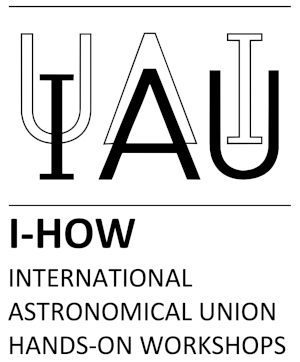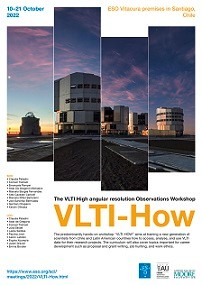VLTI-How = High angular resolution Observations Workshop
 |
VLTI-How: The VLTI High angular resolution Observations WorkshopOctober 10 - 21, 2022ESO Vitacura premises in Santiago, Chile |
|||
 |
Rationale:
Even in the era of Large Telescopes with 40m mirrors, most of the objects in the sky will still appear as point-like sources. Combining the light of different apertures in a virtual telescope is the easiest (and cheapest) way to gain angular resolution and thus to resolve details out of the reach of Extremely Large Telescopes (ELT), such as a stellar surface, the torus of Active Galactic Nuclei, the flares near the black hole in the centre of our own galaxy, the very inner scales of protoplanetary discs… and even exo-planets.
ESO's Very Large Telescope Interferometer (VLTI) is the state of the art of Infrared Interferometry. With its second-generation instruments (PIONIER, GRAVITY, MATISSE) and undergoing an upgrade to extend the capabilities to faint sources (i.e., many more scientific topics and targets), the VLTI will play a key-role in the ELT era and beyond 2030. At the same time the VLTI has a vast unexplored data archive calling for data mining.
The predominantly hands-on workshop "VLTI-HOW" aims at training a new generation of scientists from Chile and Latin American countries how to access, analyse, and use VLTI data for their research projects. The curriculum will also cover topics important for career development such as proposal and grant writing, job hunting, and work ethics.
Young researchers and scientists from Latin America will get an opportunity to analyse data from the above instruments and to use different software package for analysing the interferometric data. This will enable them to carry out their own projects using the VLTI once they have returned to their home institutes and hence result in an increase in research activities in the field of high-resolution imaging and interferometry. Moreover, the workshop will encourage new scientific collaborations across nations. The meeting may also bring in new ideas/proposals to improve future observational facilities.
Participants:
The participants will be selected among last year undergraduates, master students, Ph.D. students, post-doctoral fellows and young researchers from Latin America. Since the goal is to have about 3 or 4 students per lecturer and thus ensure that there is a strong interaction between the students and their supervisors, the aim is to have 30 attendants. The selection will be based on academic and scientific merits. “Merit” includes scientific background, ability and potential, but also likelihood of benefiting in a research career from attending the workshop and, relationship to relevant home country scientific policies.
Format:
The VLTI-HOW will consist of tutorials and lectures in the morning and hands-on sessions in the afternoon. The lectures will cover a wide range of scientific use cases. The topics will include stellar properties and surfaces, the inner scales of protoplanetary discs, extrasolar planets, the tori and broad line regions of active galactic nuclei, the black hole in the centre of our own galaxy, etc.
The afternoon sessions will provide the students with experience concerning online access to data, data reduction, state-of-the-art data analysis tools and modelling techniques.
Tools for the hands-on sessions:
The participants will be asked to bring their own laptops. In this way they will have the software installed on their computers after the workshop, and thus be able to continue using the software for their own scientific projects. Minimum hardware requirements (CPU, RAM and disk space) will be communicated to the participants in advance on the workshop website. Detailed instructions, including all necessary information for the tutorials and on what software to install and how, will also be made available on this website in due time.
Travel support:
The workshop will offer to partially cover the travel costs of selected students. The students must apply for this support. The amount of support offered will be between 25% and 50% of the costs of the cheapest ticket to Santiago de Chile from the place of origin of the student. We expect support from the student’s home institution for the majority of the travel costs, considering that lodging and meals will be fully covered (see next point) and that the home institution will benefit from the expertise gained by the student at the workshop.
In extreme situations, in which the candidates cannot find any local support and would risk not attending the workshop otherwise, the organisers may decide to cover more than the maximum of 50% given above. Such cases should be clearly justified.
Lodging:
The lodging and meals of the students and lecturers will be covered in full for the 2 weeks of the workshop.
The students and lecturers will stay at the Diego de Velasquez Apart-Hotel in Providencia, Santiago de Chile. Lecturers will stay in one-person rooms or suites; students will share rooms.
Sponsors:
ESO Code of Conduct:
We aim to host a friendly and productive meeting which is welcoming for everyone. As such, we ask all participants to adhere to the ESO Conference Code of Conduct. In summary:
- Behave professionally. Harassment and sexist, racist, or exclusionary comments or jokes are not appropriate. Harassment includes sustained disruption of talks or other events, inappropriate physical contact, sexual attention or innuendo, deliberate intimidation, stalking, and photography or recording of an individual without consent. It also includes offensive comments related to individual characteristics, for example: age, gender, sexual orientation, disability, physical appearance, race, nationality or religion.
- All communication should be appropriate for a professional audience including people of many different backgrounds. Sexual or sexist language and imagery is not appropriate.
- Be respectful and do not insult or put down other attendees or facilitators of the event. Critique ideas not people.
- Should a participant witness events of bullying, harassment or aggression, we recommend that they approach the affected person to show support and check how they are. The witness may also wish to suggest that the person report the inappropriate behaviour. However, it is up to the affected person alone whether or not they wish to report it.
- If participants wish to share photos of a speaker on social media, we strongly recommend that they first get the speaker’s permission. Participants may also share the contents of talks/slides via social media unless speakers have asked that specific details/slides not be shared.
Quick links
Keywords: Very Large Telescope Interferometer | infrared interferometry | data-mining | high-resolution imaging | VLTI instruments
Workshop email: vlti-how@eso.org*

